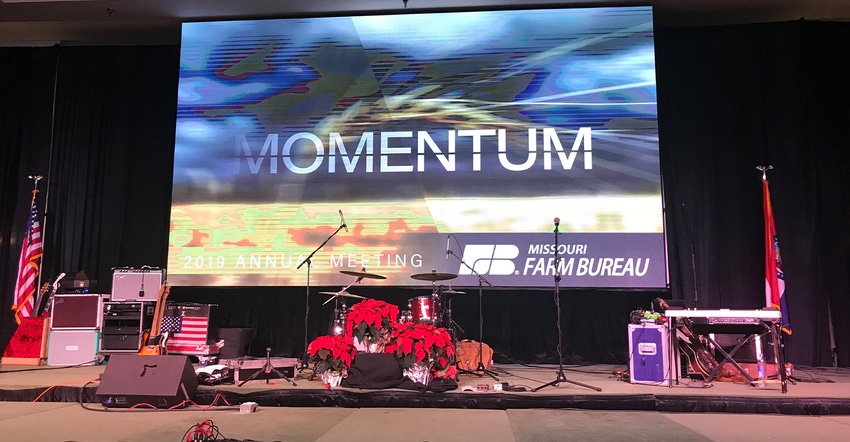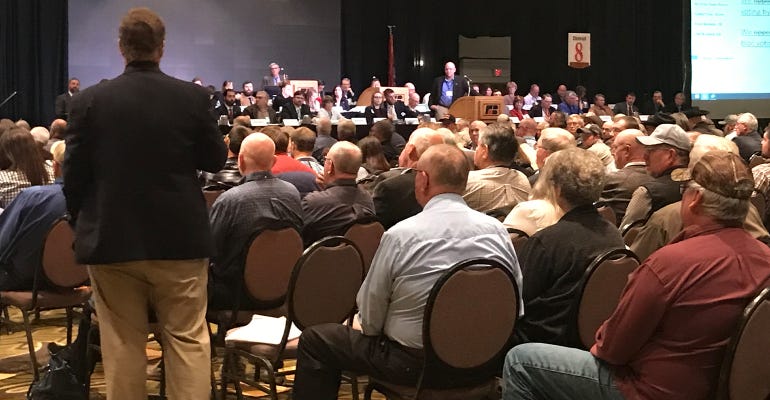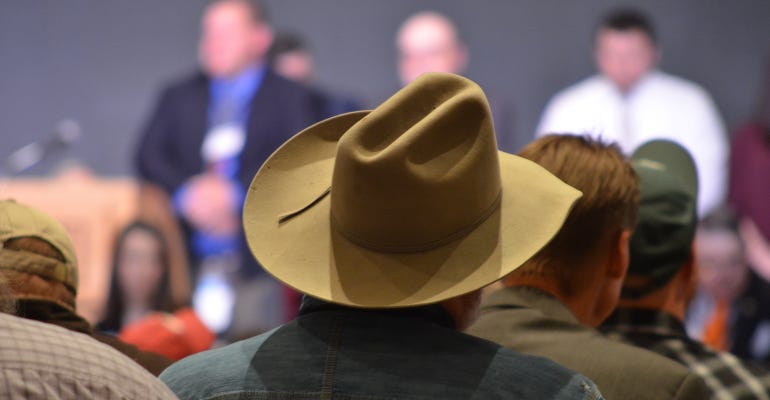
The silence that once filled the room of more than 500 Missouri Farm Bureau members began to break with side conversations as farmers and ranchers listened to a resolution calling on members of Congress to forfeit a portion of their salary during a government shutdown.
The resolution during the organization’s 105th annual meeting stated, “If any part of the federal government is shut down due to failure of Congress to pass an appropriations bill, no member of Congress should receive their salary for the duration of the shutdown. No member of Congress should receive back pay when the shutdown ends. Their pay should be forfeited.”
As Missouri Farm Bureau Vice President Todd Hays continued reading the proposed amendment, chatter filled the room. “If any part of the federal government is operating under a continuing resolution, all members of Congress should receive only 50% of their salary for the duration of the continuing resolution, with no back pay,” he said.
It was clear the state’s largest agriculture organization was sending a message for Congress to do its job. Then a loud, unanimous voice vote solidified the resolution into the 2020 Missouri Farm Bureau policies.
Every year, the Missouri Farm Bureau holds an annual meeting where delegates from each county help frame the organization's stance on issues from the federal government to fence laws.
The theme was “Momentum” — a nod to moving agriculture forward in 2020. This year’s hot topics, aside from the workings of Congress, included issues facing the dairy industry and the state’s feral hog population.

TAKING A STAND: Missouri dairyman Sean Cornelius stood to amend a resolution on the Federal Milk Marketing Order. Grassroots policymaking is how Missouri Farm Bureau shapes its organization.

Revamping dairy policy
Last year, during the American Farm Bureau Federation annual meeting, a group put a task force together to look at Federal Milk Marketing Orders, or FMMO. It consisted of dairy producers and industry leaders from across the country.
The FMMO system was established in the 1930s when farmers were facing low milk prices. FMMO was established to set a minimum milk price, determined by the USDA, dairy farmers are required to receive from milk processors in one of the 10 milk marketing areas. Two features of the system are pricing and pooling.
The proposed resolution called for reform of the FMMO to include more transparency and making the formulas and price classes reflect current market conditions. The goal was to create a workable document that AFBF could use when discussing the issues of dairy marketing on Capitol Hill. The rewrite was presented to the state group for consideration but met some opposition.
Missouri dairy farmers oppose bloc voting by dairy cooperatives but support modified bloc voting — a measure opposed by the national organization. As Sean Cornelius, a Caldwell County dairy producer and member of Dairy Farmers Cooperative said, “I support modified bloc voting. If an independent producer requests it from the cooperative, he should be given the opportunity to vote.”
Another said that the proposed AFBF language was too confusing, so about 23 of the 67 lines of new language was eliminated at the state level. Dairy farmers will see how the new FMMO resolution shapes up at the annual AFBF meeting in January.

HASSLING HOGS: Missouri farmers and ranchers are fed up with feral hogs on their property. This year, they took a stand to call on lawmakers to increase penalties for those releasing these hogs from a misdemeanor to a felony.

Feral fiasco
In 2018, there were 9,365 free-roaming hogs killed by the Missouri Department of Conservation, agencies partnering with MDC and by private landowners.
The MDC considers a feral hog as any hog — including Russian and European wild boars — that is not identified by ear tags or other identification and is roaming freely on public or private land without the land manager’s or landowner’s permission.
Despite state and private landowner eradication efforts, feral hog numbers continue to increase. In 2017, there were 6,561 feral hogs killed, up from 5,358 killed in 2016.
Missouri Farm Bureau members made feral hogs a top priority this year, calling feral hogs an “unacceptable risk to humans, livestock, crops and property.”
They called for the eradication of all feral hogs and an increase in the penalty for the intentional release of any hogs on public or private land without housing from a misdemeanor to a felony.
Members also would like to see state laws that make it a felony to hold or transport live feral hogs without permission from the Missouri Department of Agriculture. They created a provision that allows for local law enforcement to confiscate and kill feral hogs being illegally transported in the state.
Resolutions into action
The Missouri Farm Bureau has 134,900 members. The members form resolutions that are important to farming, the agriculture industry and rural living.
These members rely on resolutions adopted at the annual meeting to drive conversations with state and federal lawmakers.
Farmers and ranchers let their voices be heard whether individually or during MFB’s “Coffee with Congress” in their home county, or even during “Capitol Connection,” where every week during the Missouri General Assembly’s legislative session, MFB members travel to Jefferson City to talk with elected officials.
About the Author(s)
You May Also Like






